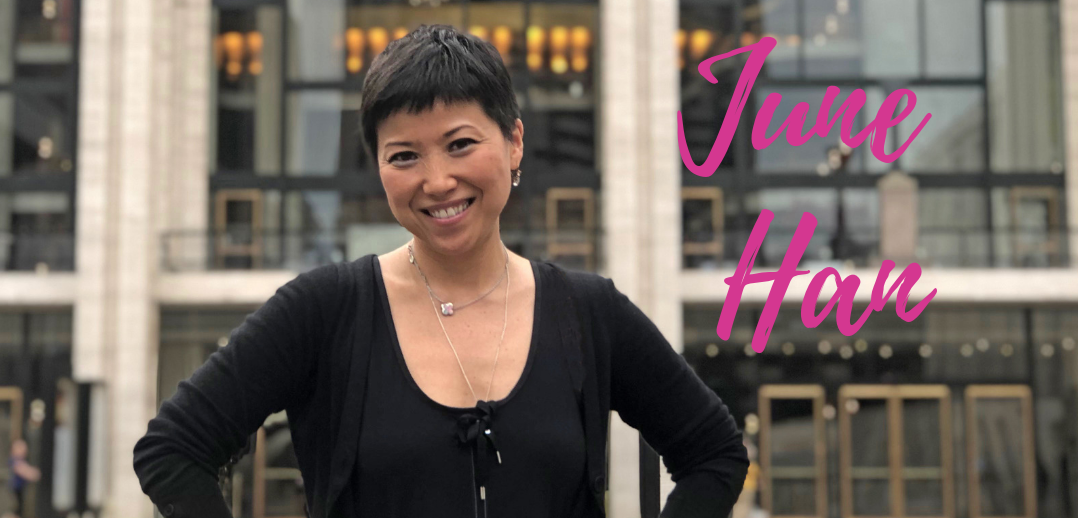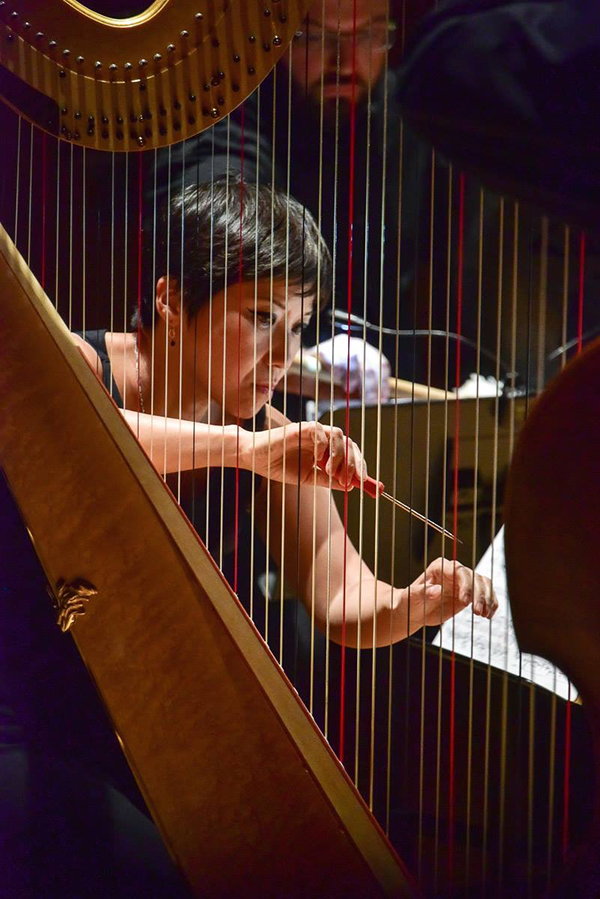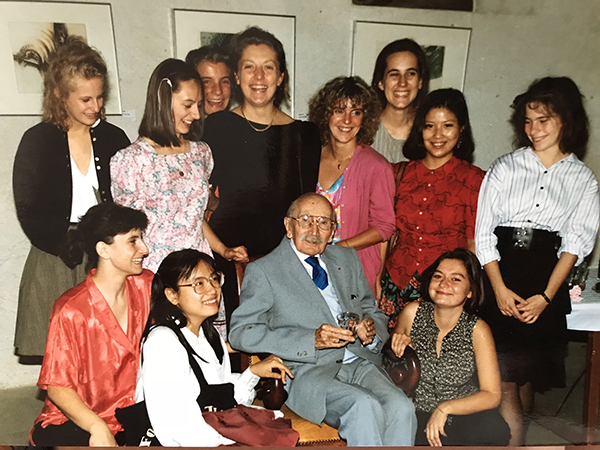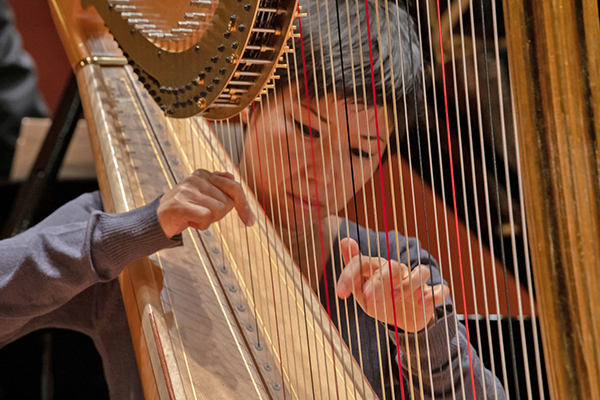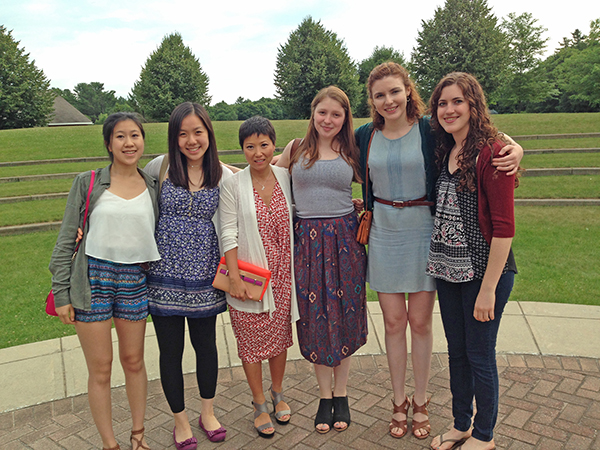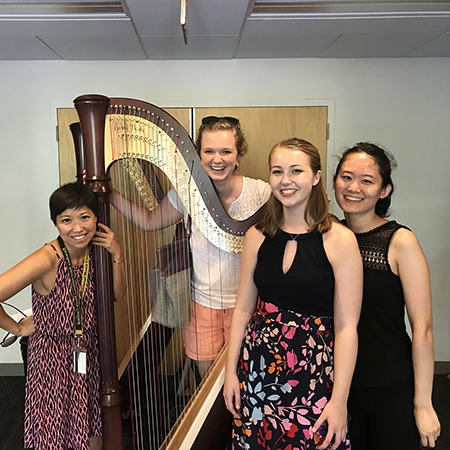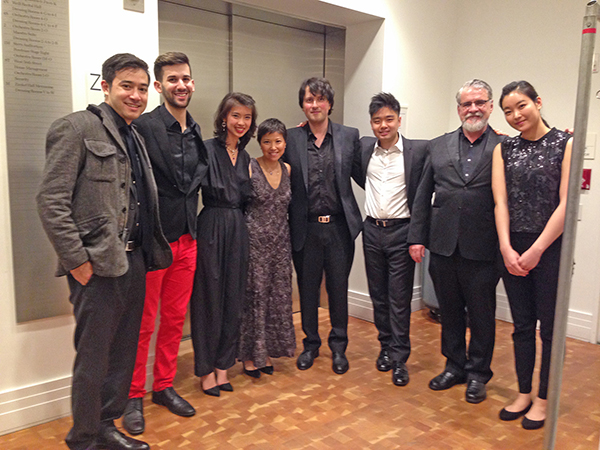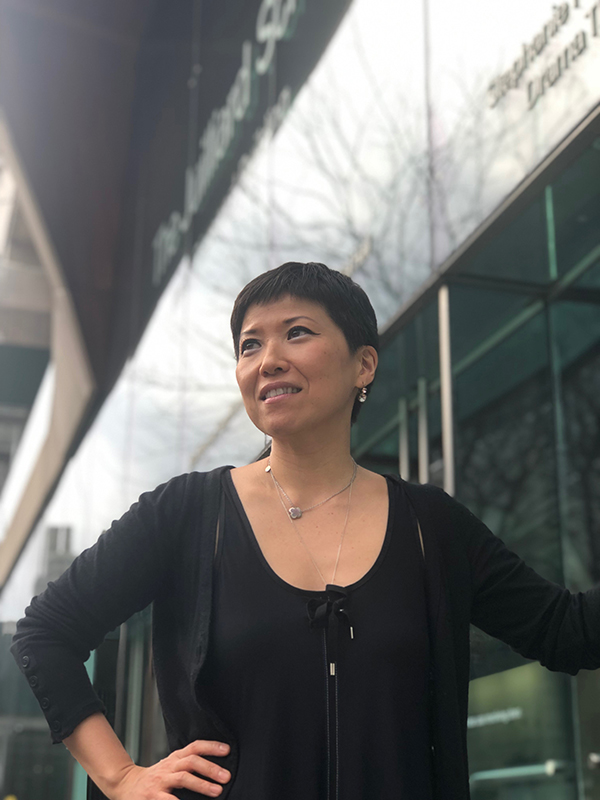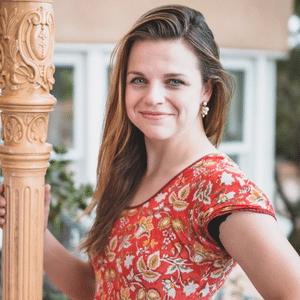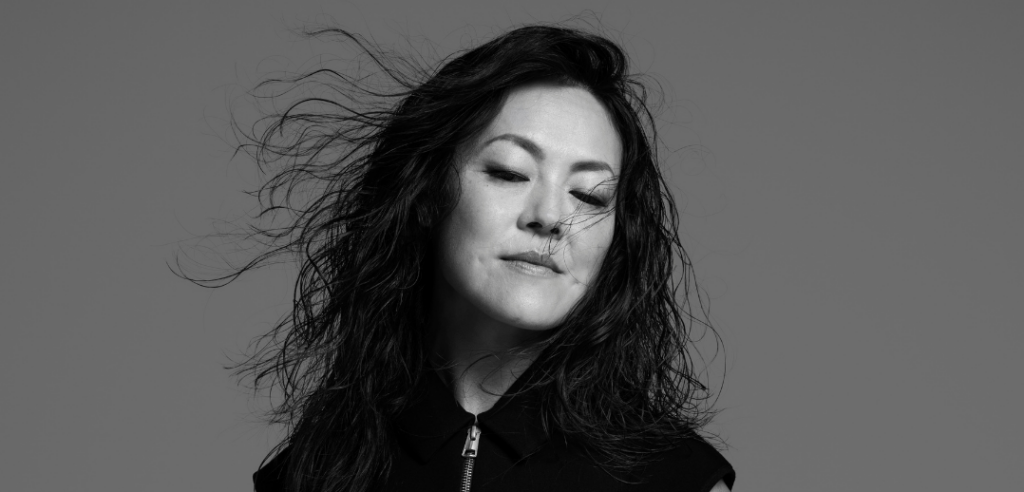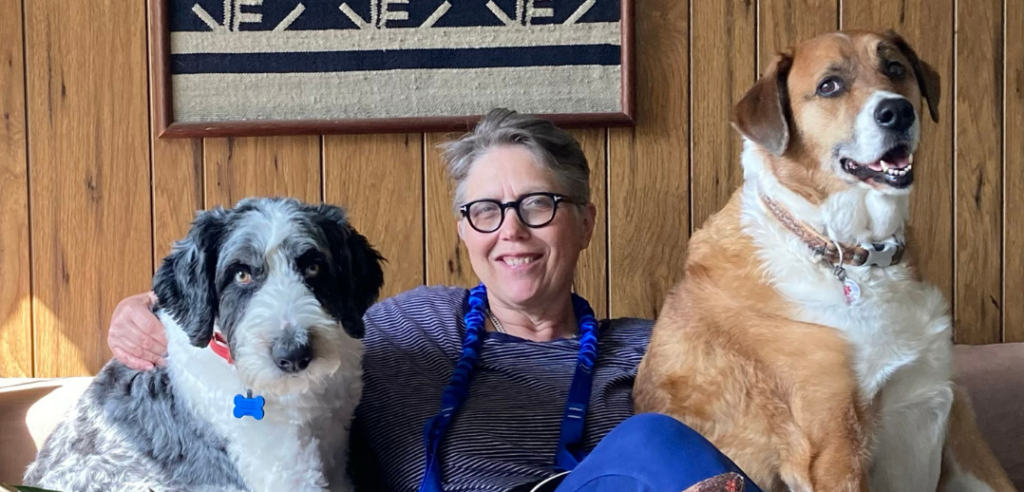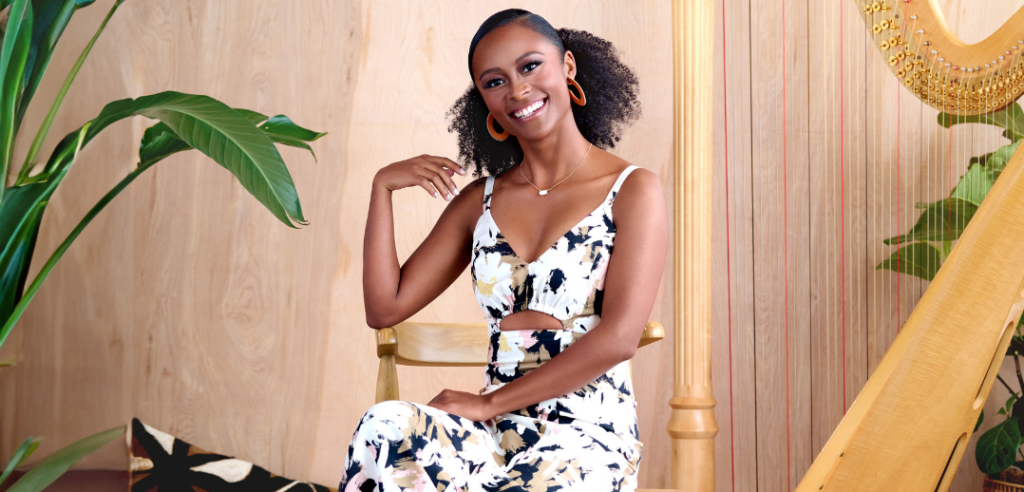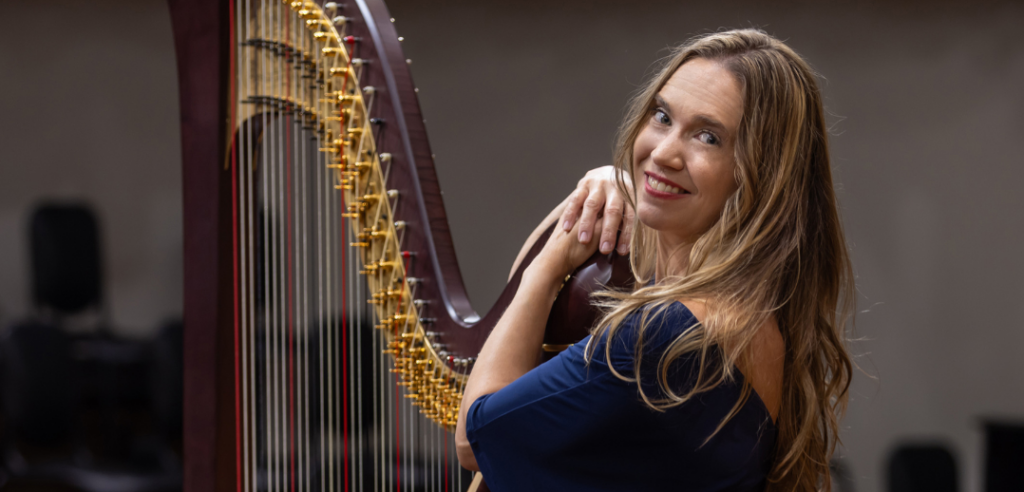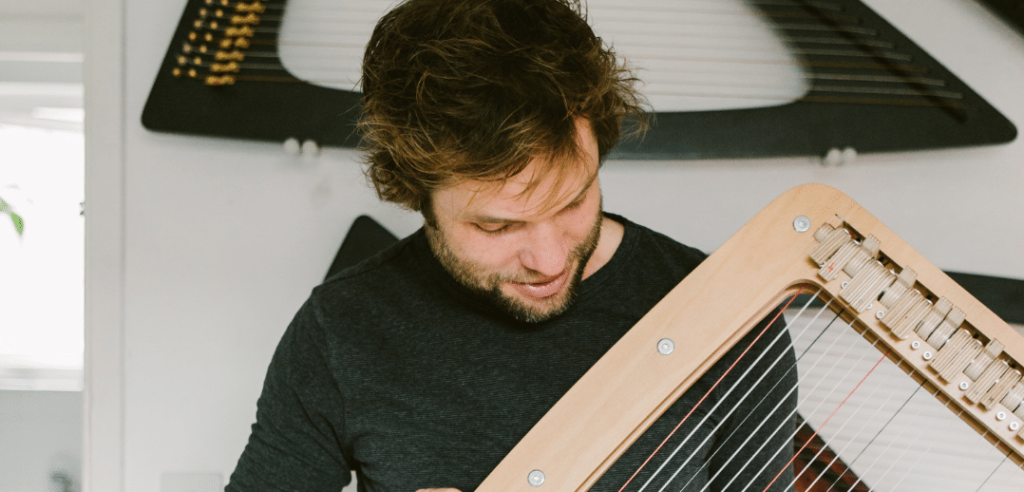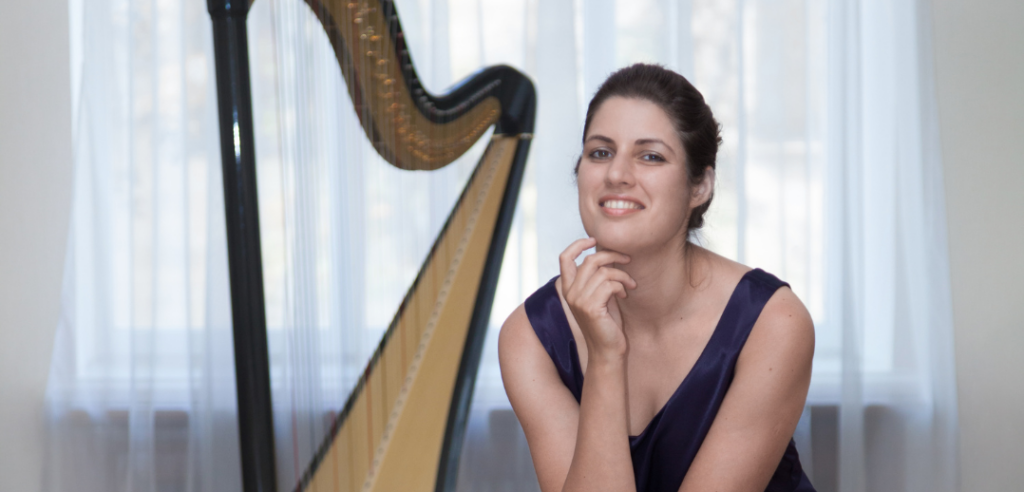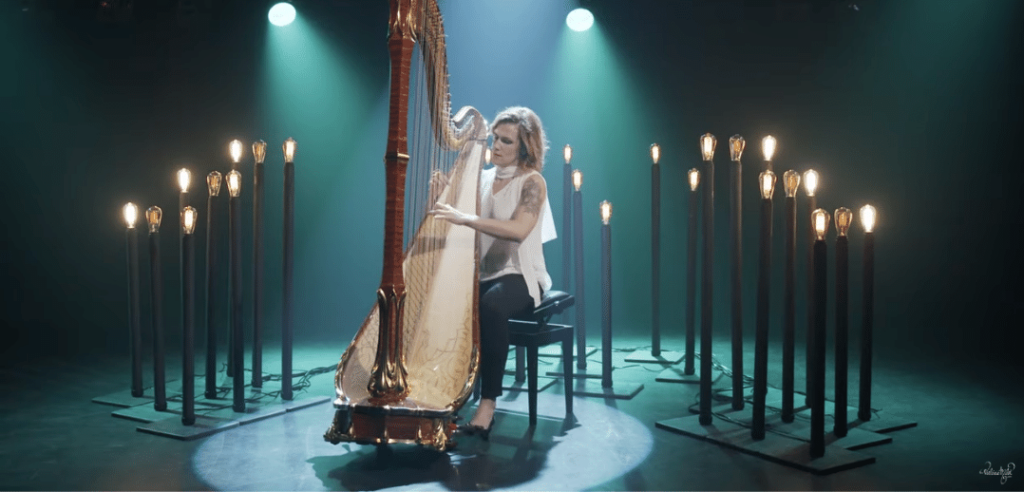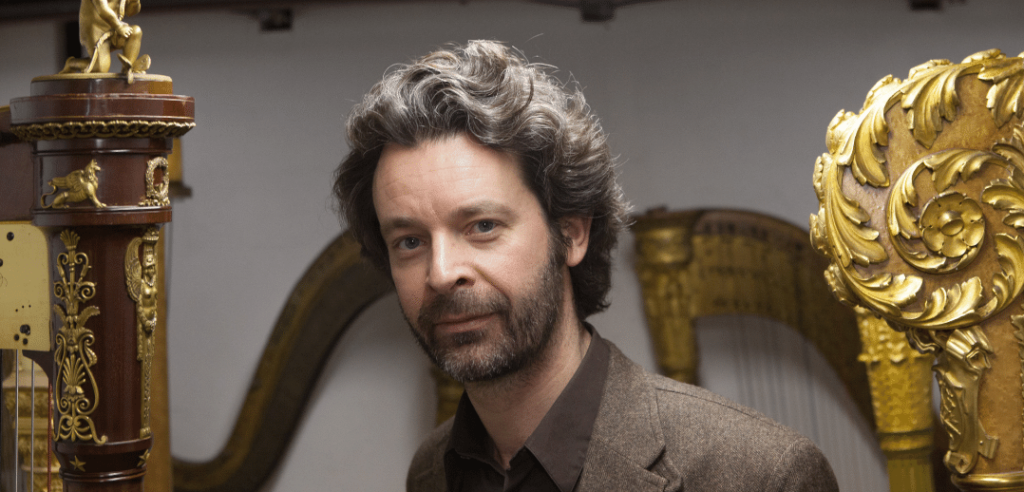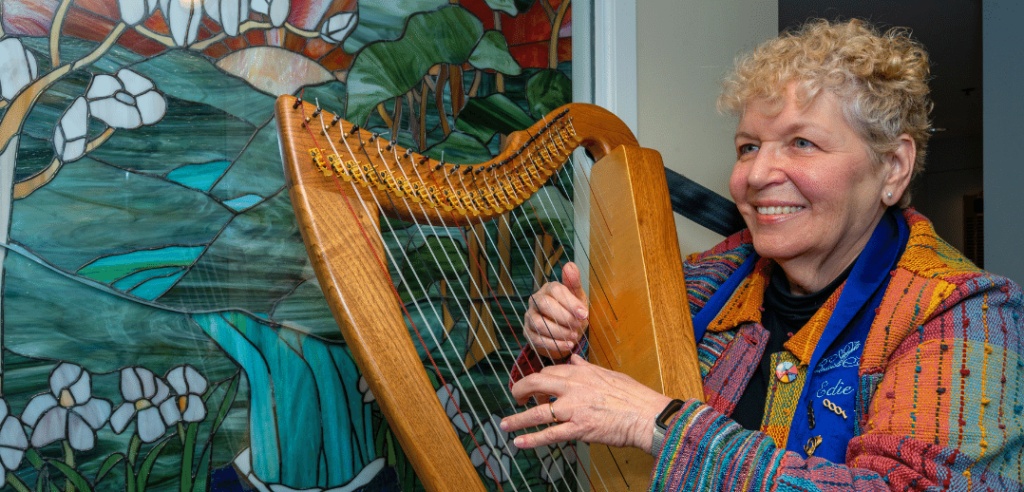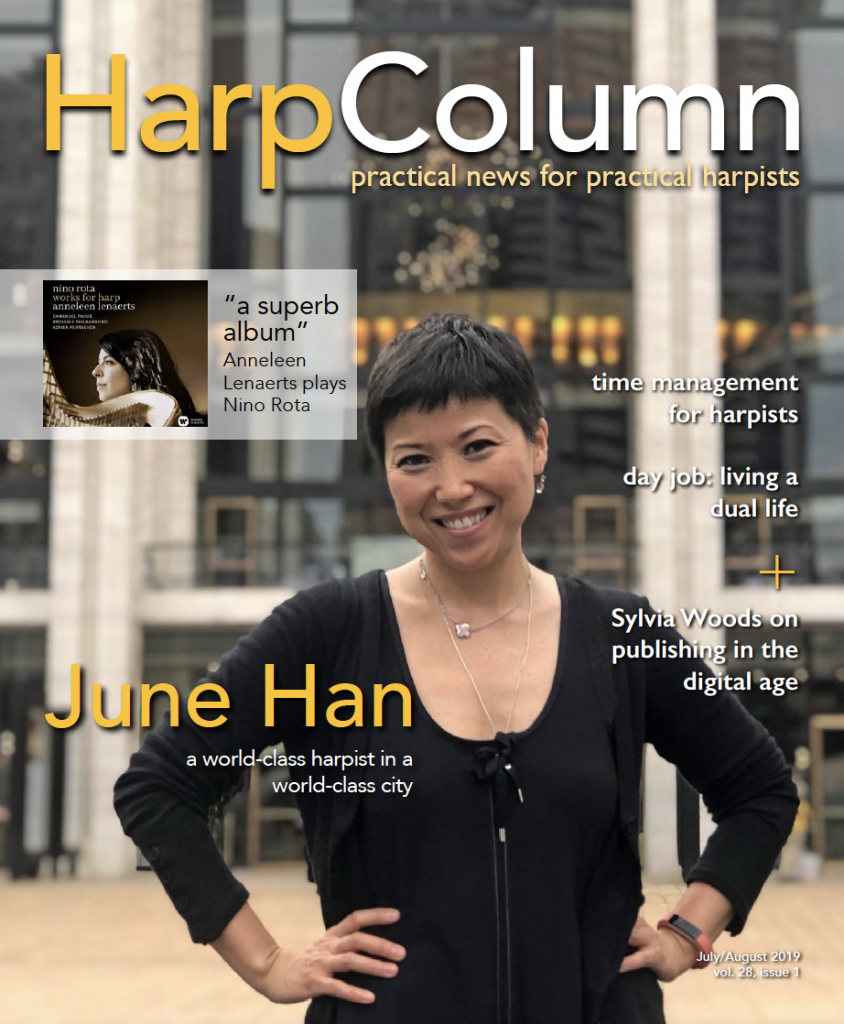For years harpists have been singing the praises of June Han.
“You really should interview her—she’s a fantastic teacher.”
“You really should interview her—she’s a brilliant performer.”
“You really should interview her—her background is fascinating.”
All those people were right. Last year Han became one of our master teachers at Harp Column Academy (harpcolumnacademy.com), and it became abundantly clear to us what all the buzz was about.
The daughter of diplomats, Han has lived all over the world. She was born in Korea, trained in France, and teaches at Yale University and Juilliard’s Pre-College program. Her playing is superb, and while she doesn’t hold a full-time orchestral position, she is the first call for many of the top orchestras in the Northeast, including the New York Philharmonic and the Boston Symphony Orchestra. She relishes the freedom her schedule gives her and fiercely guards her practice time to keep her life balanced. Han made time between rehearsals of Wagner’s Ring cycle at the Metropolitan Opera to sit down for an interview with Harp Column correspondent and another one of the six Ring harpists, Grace Browning.
Harp Column: It has been such a joy working with you in the MET’s Ring Cycle! What is it like playing all four Ring operas with six harps?!
June Han: Playing the Ring has been on my bucket list because I love opera in general, and Wagner. I’ve seen them all many times, but I never would have believed that I’d get to play the whole cycle for the first time at the Metropolitan Opera. I played stage versions with Boston Symphony and the New York Philharmonic, but this is a new experience.
HC: Have you played with six harps before? How is the experience different than playing with just two?
JH: Yes, on stage with the New York Philharmonic. It’s not necessarily better or more fun [with six] musically, but there are more people therefore more social for sure. It’s much easier to manage the tuning with just two [harps], much harder to keep all six harps in tune with each other! The MET is a special house so it’s been absolutely exciting.
HC: You mentioned to me earlier that you first saw the Ring at the MET for the first time in the ’90s.
JH: Yes. Late ’90s, early 2000s. I saw Die Walkure at least twice. One of them was a standing room ticket. I was hoping someone would leave, but nobody did, so I stood for five hours. At some point, I took off my shoes!
HC: When did you first perform the Ring Cycle?
JH: This is the first time!
HC: Have you played much opera before?
JH: I did in school and I also subbed at the New York City Opera quite a bit whenever Jessica Zhou invited me. I thought it was my dream job back then, but I don’t think so anymore [laughs]…it’s hard and exhausting for diverse reasons. Last May (2018) I played with the MET for the first time (Gounod’s Romeo et Juliette).
HC: How great that you are basically the “first call” harpist for orchestras in the Northeast: New York Phil, Boston, the MET. Did you always envision having this flexibility and versatility in your career?
JH: I didn’t envision anything. I still can’t believe how lucky I am. I started subbing sporadically with the New York Philharmonic in 2005 and with the New York City Opera. Around 2016 I started playing with Boston Symphony. I toured with both orchestras through Asia and Europe. I subbed with the Orchestra de Paris in the late ’90s too. Personally, I like to think reputation is more important than career. As a freelance performer, I enjoy the flexibility. A good balance of teaching and performing is what I like about my jobs, and I happen to be playing with the crème de la crème. I’m very lucky. Playing with the best, you grow and learn all the time. I auditioned for only a handful of orchestras in America and Europe, never actually got an orchestra job but was in the finals for Orchestra de Paris, New York City Opera, and Florida…I am really privileged to be playing with the best orchestras. So that’s my blessing.
HC: How nice that you have such a great attitude.
JH: I’m 100 percent appreciative, all the time learning. Really, the minute you feel like you’re settled and comfortable, you are regressing. If you are nervous—I tell my students—that’s great because that means you want to do well. You don’t know what’s going to happen [in a live performance]. Even during rehearsals for the Ring, I learn from left and right. I learn what to do and what not to do.
HC: That’s an interesting perspective—being a guest in an orchestra, as opposed to being a principal who is there day-in and day-out—it’s a different dynamic.
JH: For substitute players, there’s no margin for mistakes or it’s very slim. At least, that’s how I see it. I tell my students not to worry about money so much or not just yet. Just live within your budget and plan ahead and practice. I never thought I’d become a millionaire playing harp. It’s a vocation, a calling, so you do it because you want to.
HC: Did you anticipate that you’d end up living here in New York? You’ve established so many high-level performance opportunities and teaching work.
JH: No, I always wanted to live in Paris, but New York and America treat me very well. I’m not a workaholic and I love the balance I have right now. I try not to overbook myself.
HC: Yes, balance must be a challenge because you are a fantastic teacher as well. You have so many students at Yale, Columbia, Juilliard Pre-College, and Bowdoin Music Festival in the summer. How do you manage?
JH: I love teaching. One without the other, I would not appreciate my life as much. But again, I am not a workaholic. I love my days off, and I balance it to incorporate my practice days. I tell myself, “It’s a practice day,” Then it doesn’t matter whether I practice two hours or four, or 30 minutes, it’s a practice day. That means I stay home, take it easy, and practice.
HC: How do you balance all the different studios? How many students are you working with?
JH: It depends. The most I have had during a year, including private students, was 13. It’s nothing comparable to a full-time teaching position but a lot for me. This year I don’t have any Columbia students. I am very demanding, and I think overwhelming at times, and some Columbia and Yale undergraduate students have chosen to take a semester off, which I applaud as a decision. I can tell within 20 seconds if the student hasn’t practiced, and then it’s torture for both parties. A student asked me once: “How do you describe your studio at Yale?” I didn’t know how to describe it, I just said, “Every time I come here it’s a five-hour commute, but I’m always very happy to come.” And I mean it. My Yale students are always so prepared and wonderful. Some record the lesson, not to waste anything. Then the following week everything is fixed. I don’t have to repeat myself twice. Some of them have a notebook that I write in. Years after they graduate, they tell me they still have the notebook.
HC: So you look for that politeness, respect, and a serious work ethic in the students you accept?
JH: Yes. When they play an audition for 15-20 minutes, you don’t know how polite they are. Once they are my students and they are not polite, then I tell them. But it’s been very rare. Because I’m Asian, and in Asia, you have that. You don’t roll eyes to your teacher. Also, my teacher in France was very strict.
HC: You’re speaking of Marie-Claire Jamet—such a legend. [Ed.—Read Harp Column’s interview with Marie-Claire Jamet in our January/February 2017 issue.]
JH: We call her “La Grande Dame de La Harpe.”
HC: So tell me, what was your experience like with her? Was it a difficult transition first, getting used to her demands? How old were you when you started studying with her?
JH: I moved a lot growing up, and I started playing the harp very late. So when I went to Paris, it was in 1986 and I was already 18. I had come from various playing styles so when she first heard me, she said “June, it looks like you had different trainings, and I will help you from now on.” I started crying—she’s a beautiful lady. She was always very rigorous and honest with me and would say, “June, your technique is not good.” I would not get upset. Then she said, “I will help you now, but for one year, we will not do any pieces. We will only do études and exercises.” It was to me next to God’s words, and that’s how it was going to be. So I spent eight hours a day working on my technique and position. She had said no pieces, but after seven hours, I cheated a little bit and sight-read some music. That year, I changed my whole [hand] position.
HC: What were some of the things you changed?
JH: Position primarily and technique. That’s why when I’m teaching young students and my pre-college students, I am very stubborn with position and technique. During auditions, a hand position is very striking whether it’s fantastic or not. If it’s an awkward hand, you can hear it in the playing. Then I ask myself, can I work with those hands? Once they are my students, I nag them for three months or so. And if they don’t respond or fix, I’m not going to chase after them. But I’m going to nag them [at first]…
HC: …because you know it’s possible to change your technique because you did.
JH: Yes, and I also know that position is so critical to technique and longevity, and that if you fix it, there’s no roadblock. There is so much to learn in addition to technique, and if you’re going to play the harp until the day you die, you should not have tendinitis, especially when you’re 17 or 18. The first time I had joint pain in my hands was when I was practicing big chords too much and too repeatedly. That kind of thing happens, and I learned the lesson. The choice of work at that particular level of playing is also important. Marie-Claire Jamet always gave me pieces I could handle. I think that sometimes teachers assign a work too demanding to a student so that it looks impressive in an audition.
HC: Of course. But then it rushes your technique.
JH: It’s like giving a steak to a toddler. They will chew it for ages, but that doesn’t necessarily mean it improves their technique in an organic way, right?
HC: Tell us about your time studying at the Paris Conservatory.
JH: I studied with [Marie-Claire Jamet] for many years, in private first, and then I got into the conservatory a few years later. I didn’t get in the first time I applied to the conservatory. Back then (I don’t know how it is nowadays) the audition called “concours d’entrée” (entry competition) was in two rounds separated by a month. The primary teacher sits in the back of the hall but does not vote at all in the first round, and doesn’t vote until the final selections are made in the final round, in which case she can decide the order of preference.
HC: So you were voted in…by who?
JH: Guest harpists. I don’t remember who they were. It’s so long ago. But I do remember the year I didn’t get in, I remember how bad I was and so nervous. Someone [on the panel] said “B flat!” trying to help me [during a memory slip], and it didn’t even register. It was all blurry. I know what it is to be so nervous that you panic. I warn my students how nervous they might be [in performances] because I feel sometimes they naively think they’re going to play just like they practiced at home.
HC: It’s insane how much pressure we all feel when we work so hard in the practice room and we want to do our very best in every performance situation. But there’s a lot of energy and self-talk to manage. What are some of the things that you hope they gain from studying with you…also technically?
JH: I want them to always press into the strings for tone and strength, listen to evenness, to articulate all the fingers and to close them… to never ignore a weak finger and fix what they don’t like, to stay supple, to breathe, to subdivide, to sing…. Aside from the technique, I want them to remember integrity, and I tell them reputation is more important, for me, than career.
HC: What kind of integrity?
JH: Work ethic. Don’t hope it goes well, make sure it goes well. Don’t tell yourself the day before, “I wish I had two more weeks.” Be where you want to be months in advance. Even if you don’t have months, be prepared early so if you get a cold, it’s okay; cut a finger, it’s still okay. I don’t want [my students] to be ready only in the last four days. I personally could not take that stress. I also mean integrity in approaching new pieces—contemporary music. Don’t fake it out of laziness or thinking nobody will know. I can tell right away, even in a piece I’ve never heard, when a cacophony is unorganized. In terms of technique, I like to emphasize that position is important and technique is only a tool to say what you want to express with the instrument.
HC: And what are some methods to practicing technique?
JH: Mostly etude books: Lariviere, Bochsa, Pozzoli, Dizi, Schmidt, Posse. I don’t believe in doing etudes or technique in the pieces [they’re working on]. Something I always tell my younger students is, “You brush your teeth every day. I don’t understand why you wouldn’t practice your etudes every day.” Young students especially have to do it. If you don’t have two hours to practice because you have homework, school plays, and exams, then only do etudes for at least 20 minutes. It’s a helpful regimen. Also people would gladly do 50 push ups or squats but rarely do 50 repetitions of one passage. But they should. And it’s very important to keep listening to what you do and not be in denial when something isn’t sounding great.
HC: Yes, etudes should be part of your daily practice.
JH: Yes. When I was in Paris, I saw that all the good students had a great position. One girl was 15, and she learned the Fauré Impromptu in two weeks, including memorization. So when a student tells me she’s been working on a piece for six months it doesn’t make any sense to me. I’m not saying that’s wrong, but with my own students, when I say, “Let’s do this in five weeks—you can do it,” I know they can. If they don’t, it’s because they don’t want to. I know they can do it. I know they have the capacity. I think it motivates them.
HC: It’s important to set deadlines and expectations, especially when they have your support saying “you can do this.” So five to six weeks to learn any piece?
JH: Yes. In school, if the teacher asks you to read Homer’s Odyssey, maybe not in two days, but in two weeks, then you are going to do it. But no one’s going to hold a book for six months—it shouldn’t take that long. You can revisit that book again a few years later if you want to study it further. Another thing I want my students to remember is how to be a gracious loser. Of course, everybody wants to win and deserves to win. But when you don’t win, there’s somebody better who did. It might not be necessarily true, but just imagine that every second there’s someone better than you somewhere. The minute you think “I’m the best,” that’s the end of it. It doesn’t mean you have to be insecure or competitive, but I think it’s humbling to remember that there’s someone always better, and you can learn from him or her. I don’t like to hear, when a student comes back [from an audition or competition they didn’t win] and says, “Oh, it was not fair…” No, it doesn’t matter whether it was fair or not. It’s important to me to be gracious and to not criticize the other competitors too much.
HC: Yes, personal integrity and respecting other musicians is huge, especially with other harpists. We gain so much from supporting each other. Do you feel like you’ve cultivated that kind of supportive environment in your various studios?
JH: Yes very much so, especially at Yale. It’s a small community. Only a couple of times in my life have I had to tell a student, “You have an attitude.” It’s just something I cannot accept. In Asia, we have the ethics of Confucius—respect to the elderly. In French culture, politeness is also huge, and all my schooling was in a French school.
HC: What a gift that you can be so forthcoming with your students.
JH: I hope they know it’s for them. Sometimes I tell them, “I shouldn’t have to tell you this, your parents should tell you this.” But I had really brilliant students academically and can’t complain. One time I gave a B+ to a student. She was unhappy, of course, so we met to discuss. I told her, “If you wanted an A, it wasn’t in the picture. It was either B+ or B. Her face really went south, and I said, “I did all my education to teach. Your work does not reflect the same respect to me as to your other teachers, and yet I am at the same level as your other teachers in this university. If you just want to have coffee and a grade, just tell me so.” That was right before Christmas. When she came back in January she had practiced so much and sounded so great, it almost made me laugh. After the lesson I asked, “Did you have lessons with your former teacher during the break?” She said, “No, I just practiced all break.” That’s why I like smart people—they don’t begrudge, they understand and fix things right away. Then I said, “Now you deserve an A, so I will change the grade. You have set your standards a little higher, so it’s your job to keep them there.”
HC: That’s so meaningful because so much of teaching is more than music, it’s the lifestyle and the approach.
JH: Young harpists these days are so tremendously talented. That’s why I cannot become a relic or something. I must keep practicing to stay in shape.
HC: I want to hear more about this amazing upbringing you had, living all over the world as a child of diplomats. Tell me, how do you think living in all of these different places in the world shaped you, not only as a musician, but as a person?
JH: Well, I adapt very well to different places, and family is the most important thing. When I was 10 months old, we moved to Belgium. I grew up there until I was 4, then I went back to Korea. At age 8, we went to Africa—Ivory Coast, a French speaking country—so I learned French. In Belgium I had already learned French of course, and I was very fluent, but at 4, you don’t really write. So when I came back to Korea at age 4, I was singing all these French songs, but six months later, I forgot all the words and started singing Korean songs. Before we went to the Ivory Coast, my mother was worried. “June, can you say ‘docteur’?” She wanted to check if I could do the French “R” sound. I couldn’t say it. Then she made me practice “huit ans et demi” [eight and a half years old in French]. If anyone asks something to a child, chances are they want to ask your age. It’s the only sentence I knew when I landed in Africa. We lived there for four years, and then moved back to Korea. Then I went to Indonesia, learned Indonesian, but I attended the French school in town. So all my schooling was French. After that, back to Korea and then to Holland. From Holland, we went to Paris.
HC: Okay, and you arrived in Paris when you were 17, and that’s when you met Marie-Claire Jamet.
JH: Yes. So with all the travels, I’m not nervous going to an unfamiliar place. My family has been the core unit, more than friends, because I lost track of childhood friends. Back then, we didn’t have email.
HC: Right, how would you keep in touch?
JH: Exactly. We had something called cahier d’amitié, which means a “friendship notebook.” So when you’re leaving a country, everyone passes it around…you cut your hair and tape it in there, write notes, draw things…
HC: Like a yearbook!
JH: Yes, but with no photos. I remember their names, but I haven’t seen them since I left. That made me stronger as an independent person, and I believe in language skills. People say music is related to math, but for me, it’s completely lingual. Language needs articulation, style, eloquence, clarity—all that is really close to the way we play music. Clarity is like counterpoint, style is like different musical styles and so on.
HC: So what would you say is your own language?
JH: My mother tongue is Korean, but I prefer to read in French. But I live in America, so I speak English, but with an accent.
HC: Your English is beautiful! So you associate your languages with different parts of your life.
JH: People ask, “What language do you dream in?” It depends on who stars in my dream.
HC: Who are your major musical influences? Were your parents musical at all?
JH: My father is a music lover and my mother, Young Ja Lee, is a very famous composer in Korea. So I would say my mother was my major musical influence because she’s the one who made me start music: piano then harp. But it’s not just one person. I’m very lucky, I only had the top teachers in the universe. Marie-Claire Jamet was wonderful. And then I met Nancy Allen, and she was completely different, but exactly what I needed at that stage of my life. Without a doubt, I must have done something right in my former life.
HC: What did you get when you studied with Nancy? What was it that you needed?
JH: I don’t know what I needed, but it just happened to be perfect for me. In Paris, I was always striving to play as cleanly and perfectly as I could. But then I noticed how Nancy would find beauty in a student who would play the Fauré Impromptu under tempo, and this perspective of hers really struck me and inspired me. Not that Madame Jamet didn’t train me that way, but Nancy’s approach was encouraging and motivating. When I came to study with Nancy, I was already grown—I was 23. I have vivid memories of lessons where we tackled a Mozart piano sonata and we spent half an hour on a few bars in a chromatic passage. Nancy said, “We want to make this perfect, right?” Everything evolved in the right direction for me, because I had fixed my technique in Paris and learned the standard repertoire. In the conservatory, students had two lessons a week—one with the primary teacher and one with the associate teacher. We did the solo repertoire with Marie-Claire Jamet and orchestral excerpts and contemporary music with Francis Pierre. He passed away few years ago, but he’s the harpist for whom Berio wrote the Sequenza. Whenever I play it, I think of him.
HC: Let’s talk for a moment about contemporary music. You’re a big proponent of it and you’ve premiered various pieces.
JH: I premiered all my mother’s pieces—solo and chamber. She just wrote a concertino for harp and 15 strings that I premiered in Seoul last October. Lei Liang also wrote a concerto for me, and I’ve recorded a few works by John Zorn and Charles Wuorinen. Samuel Adler also wrote a solo work for me (and Bridget Kibbey). Bridget and I did the U.S. premiere of Freude (by Stockhausen).
HC: Why do you think you’re drawn to this genre?
JH: I’m drawn to it perhaps because my mother is a composer. Sometimes new music is played only once, but I want the composer to trust me that I will practice this as much as I would any standard repertoire. I really do spend a lot of time. One composer said to me, “Thank you for looking at my music with microscopic eyes.” But I said, “It’s important to me—I don’t want to learn a wrong note!”
HC: Yes, for your integrity and for theirs. Are there particular composers you really like working with? What is that dynamic like?
JH: Lei Liang who wrote the concerto was very kind, supportive, and inquisitive. If anything he wrote was awkward, he wanted to know. He wrote a beautiful work. Sebastian Currier is a wonderful composer that I admire, and I just love playing his works. Poul Ruders is a beautiful Danish composer. I didn’t work with him in person, but I worked via email with him. He’s the one who said, “Thank you for the microscopic eyes.” It was a piece commissioned by the World Harp Congress a long time ago. I didn’t have a recording of it, and the part I had was confusing. So when I learned it, I really wanted to be accurate because I really liked it—it’s a beautiful piece. Also my doctoral dissertation at Juilliard was about harp concertos written since 1925.
HC: Okay, now for some fun lightning round questions. You have a regular commute from New York to New Haven. How do you pass the time?
JH: I eat, email, play word games, and message with friends in Seoul, there’s a 14-hour time difference.
HC: What word games do you play?
JH: It’s called “Hooked on Words.”
HC: We’re talking, like, Scrabble?
JH: You have to find words from a grid of letters. You can build words in any direction. I like words. I always have a book in my purse. French books are small, and light to carry.
HC: What are you reading?
JH: It’s called Platforme by Michel Houellebecq.
HC: What is on your music stand at home right now?
JH: The Ring, Introduction and Allegro [by Ravel], and the Debussy Prelude de l’apres-midi for flute and harp.
HC: What was the last thing you listened to on the phone or stereo?
JH: A student’s recording of an excerpt. Because when they have a recital or audition, I ask them to send me clips so I can listen and give them comments. Then they can continue working on it during the week. She sent me Fire Music last night.
HC: Do you listen to any non-classical music?
JH: Very rarely, but when I do, I like country music. It’s soothing and I love cowboys. That’s something people don’t know about me.
HC: Don’t ever change.
JH: You know why I like them? They’re gallant.
HC: Really? In theory?
JH: In the movies. I grew up watching Western movies with my father. I want them to take their hats off for me and take me to the saloon.
HC: Favorite opera you’ve ever played:
JH: The Ring or La Boheme, also Madame Butterfly. Oh, and then I love Britten!
HC: One of your most memorable symphonic experiences playing with New York Philharmonic?
JH: Not one in particular. I love playing Bartok’s Concerto for Orchestra. I liked discovering the huge part in Bartok’s Wooden Prince. Oh, and one of the first things I played at the Philharmonic was Smetana’s Vysherad. It was so beautiful. The harps were separated in an antiphonal way, on both sides of the stage. I was nervous but didn’t say it. There is never a dull moment when you play with the philharmonic and Nancy Allen. Every week has been special.
HC: What kind of harp do you play?
JH: Lyon & Healy 23 gold.
HC: Is that your favorite?
JH: Not particularly. I want an 11. [Laughs]
HC: Uber or Lyft?
JH: Uber. But I usually walk!
HC: Favorite post-concert spot in New York?
JH: A few spots: Lincoln next to the hall, right near the plaza by the fountain. Then Bar Boulud, Boulud Sud.
HC: Beach or mountains?
JH: Beach.
HC: Which beach?
JH: Any beach.
HC: Guilty pleasure?
JH: TV. I love TV.
HC: Favorite channel?
JH: The Cooking Channel.
HC: What’s your favorite dish to make?
JH: Chicken.
HC: Coq’ au vin?
JH: Korean chicken soup! It’s “old people” soup, but it’s amazing.
HC: Favorite childhood memory?
JH: Traveling with family.
HC: Red or white wine?
JH: It depends. White, although now I’m drinking Bandol—a place where my friend lives (south of France). I love Chardonnay from California. Sauvignon blanc from New Zealand. I don’t necessarily like French white wine, but I love Sancerre.
HC: If you could go anywhere in the world tomorrow, where would you go?
JH: I want to go on a safari.
HC: Well you’re an adventurer, and a tough cookie and a brilliant lady.
JH: Tough old cookie.
HC: You’re brilliant, and this has been so fun. Thank you. •





